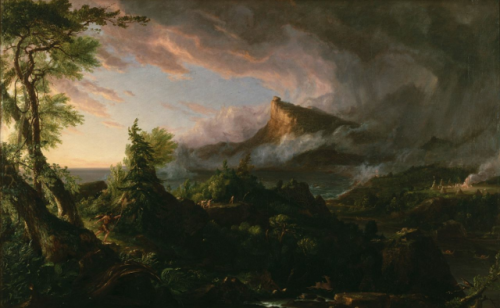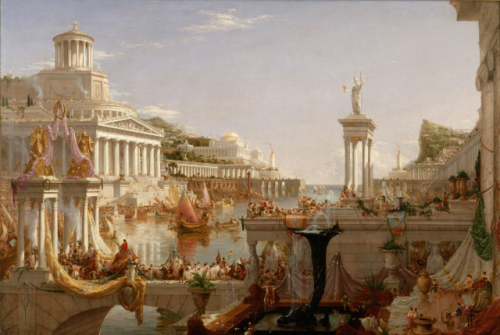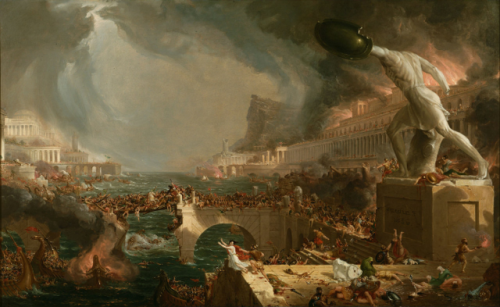sugarvsbitter
One way ticket to Andromida~
191 posts
Latest Posts by sugarvsbitter

@kerroum97

كتاب أول مرة أتدبر القرآن .

سمع الله لمن حكى و من دعى و من حمد و من بكى ، ربنا ولك مافي القلب ..!

يحكى أن( بهلول) كان رجلا مجنونا فى عهد الخليفة العباسي هارون الرشيد .. وفي يوم من الأيام مر عليه هارون الرشيد وهو جالس على إحدى المقابر ..
فقال له هارون معنفا : يا بهلول يا مجنون… متى تعقل ؟
فركض بهلول وصعد إلى أعلى شجرة ثم نادى على هارون بأعلى صوته : ياهارون يا مجنون…. متى تعقل ؟
فأتى هارون تحت الشجرة وهو على صهوة حصانه … وقال له : أنا المجنون أم أنت الذي يجلس على المقابر ؟ فقال له بهلول : بل أنا عاقل !! قال هارون : وكيف ذلك ؟ قال بهلول : “لأني عرفت أن هذا زائل ،، (وأشار إلى قصر هارون) وأن هذا باقِ ،،، (وأشار إلى القبر) فعمرت هذا قبل هذا ،،، وأما أنت فإنك قد عمرت هذا (يقصد قصره) وخربت هذا (يعنى القبر) .. فتكره أن تنتقل من العمران إلى الخراب مع أنك تعلم أنه مصيرك لامحال ” …. وأردف قائلا : فقلّ لي // أيّنا المجنون ؟؟
فرجف قلب هارون الرشيد وبكى حتى بلل لحيته … وقال : “والله إنك لصادق ..”
ثم قال هارون : زدني يا بهلول… فقال بهلول : “يكفيك كتاب الله فالزمه”
قال هارون : “ ألك حاجة فأقضيها ” قال بهلول : نعم ثلاث حاجات ،،، إن قضيتها شكرتك .. قال : فاطلب ،،، قال : أن تزيد في عمري !! قال : “لا أقدر ”
قال : أن تحميني من ملك الموت!! قال : لا أقدر ..
قال : أن تدخلني الجنة وتبعدني عن النار !! قال : لا أقدر ..
قال : فاعلم انك مملوك ولست ملك ،، “ ولاحاجة لي عندك” …..
(كتاب عُقلاء المجانين)

لَمْ يَكُنْ يَوْماً وَحِيداً، فَقَدْ كانَ لديهِ مَكْتَبَة.
عندما إنتهينا من حديثنا العميْق شعرت أني لأول مرة..عائِدة من النّجوم..
إنما أنا أخاف نفسي … أخاف خيالي وما ينسج لي من صور
د. أحمد خالد توفيق (via mjcodez)

“… أُصلي ”

@mjcodez.

قال الله تعالى
{وَلا تَسْتَوِي الْحَسَنَةُ وَلا السَّيِّئَةُ ادْفَعْ بِالَّتِي هِيَ أَحْسَنُ فَإِذَا الَّذِي بَيْنَكَ وَبَيْنَهُ عَدَاوَةٌ كَأَنَّهُ وَلِيٌّ حَمِيمٌ *وَمَا يُلَقَّاهَا إِلاَّ الَّذِينَ صَبَرُوا وَمَا يُلَقَّاهَا إلا ذُو حَظٍّ عَظِيمٍ}
(سورة فصلت الآيتان (34 - 35).
I hate crying. I never entirely know if the tears are mine or someone else’s…
She struggled with her sadness, but tried to conceal it, to divide it into smaller and smaller parts and scatter these in places she thought no one would find them.
Nicole Krauss




calm down Sana 😆









Pride cacti!!!! I originally just made the ace (cactace) and aro ones, but…..then I got carried away…. They’re all gonna be stickers eventually, and the older (slightly less detailed) versions of the ace and aro ones are available already, here!
edit: they’re on society6! and the stickers are available here!!

some hindi verbs for beginners
करना = to do
लेना = to take
देना = to give
देखना = to see
दिखना = to be seen/to appear
सुनना = to hear
गाना = to sing
गुनगुनाना = to hum
सीखना = to learn
सिखाना = to teach
हँसना = to laugh
मुस्कराना = to smile
छूना = to touch
गुदगुदाना = to tickle
सोना = to sleep
जागना = to wake (self)
जगाना = to wake (someone)
Indo-European Languages
Since the majority of the languages I am learning are ones from the Indo-European language family, I have listed some words in French, Italian, Russian, Persian and Hindi which are either closely or distantly related to each other.
-The words are in the order in which their respective languages appear above in bold; —- means the language doesn’t have a related term-
one, un, un, один [odín], یک [yek], एक [ek] two, deux, due, два [dva], دو [do], दो [do] three, trois, tre, три [tri], سه [se], तीन [tīn] four, quatre, quattro, четыре [četýre], چهار [chahâr], चार [chār] five, cinq, cinque, пять [pyat’], پنج [panj], पाँच [pãnch] six, six, sei, шесть [šest’], شش [shesh], छः [chhah] seven, sept, sette, семь [sem’], هفت [haft], सात [sāt] eight, huit, otto, восемь [vósem’], هشت [hasht], आठ [āṭh] nine, neuf, nove, девять [dévyat’], نه [noh], नौ [nau] ten, dix, dieci, десять [désyat’], ده [dah], दस [das] one hundred, cent, cento, сто [sto], صد [sad], सौ [sau] mother, mère, madre, мать [mat’], مادر [mâdar], माता [mātā] father, père, padre, —-, پدر [pedar], पिता [pitā] brother, frère, fratello, брат [brat], برادر [barâdar], भाई [bhāī] sister, sœur, sorella, сестра [sestrá], خواهر [khwâhar], —- young, jeune, giovane, юный [yúnyy], جوان [javân], युवा [yūva] eye, œil, occhio, очки [očkí] (glasses), —–, आँख [ãnkh] tongue, langue, lingua, язык [yazýk], زبان [zabân], जीभ [jībh] heart, cœur, cuore, сердце [sérdce], —-, हृदय [hrday] knee, genou, ginocchio, —-, زانو [zânu], घुटना [ghuṭnā] bone, os, osso, кость [kost’], استخوان [ostokhwân], अस्थि [asthi] foot, pied, piede, пешкoм [péškom] (on foot), پا [pâ], पैर [pair] tooth, dent, dente, десна [desná] (gums), دندان [dandân], दंत [dãnt] bear, ours, orso, —-, خرس [khers], रीछ [rīchh] wolf, loup, lupo, волк [volk], گرگ [gorg], वृक [vrk] star, étoile, stella, звезда [zvezdá], ستاره [setâre], तारा [tārā] night, nuit, notte, ночь [noč’], —-, —- sun, sol, sole, солнце [sólnce], خور [khûr] (east), सूरज [sūraj]
I am at home
Italian: sono a casa
German: ich bin zuhause / zu Hause
French: je suis à la maison
Hindi: main ghar par hoon
Russian: я дома

I am tired
Italian: sono stanco
German: ich bin müde
French: je suis fatigué
Hindi: main thak gaya/i hoon
Russian: я устал/а

Russian equivalents to popular English colloquial expressions
How does one say…
I know, right?
Не то слово! — “that’s not the right word” (=“in fact things are even more *whatever* than you say”)
Не говори! — “don’t (even) say (that)”
Точно!/Именно! — Exactly!
Так и есть — that’s true
Вот-вот! — that’s it!
In the end, Ultimately
В конце концов = “after all”
В итоге — eventually
В конечном счёте
Yeah sure!
Ага, конечно!
Ну да! (intonation significantly goes DOWN, otherwise you’ll just show agreement without any sarcasm)
Ага, щас (distorted сейчас)! — “yeah, right now!”
I’ve had enough!
С меня хватит!/С меня достаточно!
Мне (это) надоело!
Меня это достало! (slang) — I’m sick of it!
Я сыт/а по горло! — I’m fed up; this one is really dramatic
Хватит! — Enough!
So what?
(Ну) и что?
И что с того? — less common now. Probably used to be the first version of the phrase, that got shorter over time.
Nope
Не — Nah
Не-а — Nope
Like
Типа — sort of, kinda
Такой/ая — for ‘someone was like’, ‘and then someone goes’,
ex.: Ну он мне говорит: «Иди домой!»,
а я такой: «Не-а!» —
So he says, “Go home!”, and I go, “Nope!”.
Note: you can use this one for citing, as well as for paraphrasing.
Hindi Lesson 10: Verbs
This lesson is going to focus on vocabulary, because after all, you can know all the grammar but if you don’t know any words, you still can’t say anything. People use verbs all the time, so let’s start here.
Some of the most common verbs are:
होना - hona - to be
करना - karna - to do
बनाना - banana - to make
लेना - lena - to take
देना - dena - to give
आना - aana - to come
जाना - jaana - to go
देखना - dekhna - to see, to look
सुनना - sunna - to hear, to listen
बैठना - baithna - to sit
हँसना - hansna - to laugh (sometimes also to smile)
सोना - sona - to sleep (in some dialects this also means to lie down)
जागना - jaagna - to wake (one’s self)
Now, Hindi has a very common thing called “compound verbs” where you take a noun or adjective and add a verb right after it (most commonly karna) to express doing that thing. The noun or adjective stays the same (you don’t have to worry about any cases or postpositions), while the verb takes the tense markings.
Some common ones are:
काम करना - kaam karna - to work
पढ़ाई करना - padhai karna - to study, to do studies
शुरु करना - shuru karna - to start
बंद करना - band karna - to close, to turn off
तय करना - tay karna - to decide
In the simple present tense it works like this:
मैं काम करती हूँ। main kaam kartee hoon. - I (f) work.
आप पढ़ाई करते हैं। aap padhai karte hain. - you (m, polite) study.
This is an extremely useful structure to know, for one reason: 90% of loan words from English are used as compound verbs with karna. Hindi speakers use a lot of English in their vocabulary, so if you don’t know the word for something, you can stick ANY English word into this structure and chances are very good you’ll be understood. In fact, you might be right and sound natural!
This doesn’t mean you shouldn’t learn the actual Hindi words for things - you absolutely should, if only for the sake of linguistic preservation but also because many of them are used - but when you’re practicing speaking and want to express yourself? This will take you a long way.
Some commonly used words (and their slightly less common shuddh hindi counterparts) are:
dance karna डैंस करना (नाचना naacna) to dance
count karna कउंट करना (गिनना ginna) to count
cancel karna कैंसेल करना (रद्द करना radd karna) to cancel
choose karna चूज़ करना (चुनना cunna) to choose
Example: हम सब लोग रात भर डैंस करते हैं। hum sab log raat bhar dance karte hain. We all dance all night long.
Bonus words:
सब - sab - all, every
लोग - log - people (only exists in the plural)
रात - raat (f) - night
दिन - din (m) - day
भर - bhar - entire, the whole time
Hindi Space Vocabulary
अंतरिक्ष (antariksh)[m]- space ब्रह्मणड (brahmāṇḍ)[m]- universe विश्व (vishva)[m]- cosmos बिग बैंग सिद्धांत (big bang siddhaṅt)- big bang (siddhaṅt means theory) आकाश गंगा (ākāsh gaṅga)[m]- galaxy (literally sky ganges) सौर मण्डल (saur maṇḍal)[m]- solar system तारा (tārā)[m]- star राश् (rāsh)[f]- constellation ध्रुव तारा (dhruv tārā)[m] - northern star सुर्य (surya)[m]- the Sun चाँद (cāṅd)[m]- the Moon ग्रहण (grahaṇ)[m]- eclipse ग्रह (graha)[m]- planet बैना ग्रह (beina graha)[m]- dwarf planet बुध (budh)[m]- Mercury शुक्र (shukra)[m]- Venus पृथ्वी (prthvī)[f]- Earth मंगल (maṅgal)[m]- Mars शनि (shani)[m]- Saturn बृहस्पति (brhaspati)[m]- Jupiter अरुण (aruṇ)[m]- Uranus वरुण (varuṇ)[m]- Neptune यम (yam)[m]- Pluto काला छिद्र (kālā chidra)[m]- black hole उल्का (ulkā)[f]- meteorite नीहरिका (nīhārikā)[f]- nebula माहनेव (māhaneva)[m]- supernova ध्रुवीय ज्योति (dhruvīya jyoti)[f]- aurora (literally northern flame) इन्द्रधनुष (indradhanūsh)[m]- rainbow वायुमण्डल (vāyumaṇḍal)[m]- atmosphere सम्तप मण्डल (samtāp maṇḍal)[m]- stratosphere हवा (havā)[f]- air आकाश (ākāsh)[m]- sky, heaven गुरूत्वाकर्षण (gurūtvākarshaṇ)[m]- gravity विकिरण (vikiraṇ)[m]- radiation खगोल विज्ञान (khagol vijñān)[m]- astronomy खगोल विज्ञानी (khagol vijñanī)- astronomer ज्योतिषशास्त्र (jyotishshāstra)[m]- astrology अंतरिक्ष यात्री (anatriksh yātrī)- astronaut (yātrī means traveler) अंतरिक्ष केंद्र (antariksh kendra)[m]- space station अंतरिक्ष यान (antariksh yān)[m]- spacecraft (yān means vehicle) रॉकेट (rōkeṭ)[m]- rocket उपग्रह (upagraha)[m]- satellite कक्ष (kaksh)[m]- orbit दूरदर्शी (dūrdarshī)[f]- telescope वेधशाला (vedhshālā)[f]- observatory अपर देशीय (apar deshīya)[f]- extraterrestrial life उड़न तश्तरी (uṛān tashtarī)[f]- UFO (literally flying saucer)
Hindi Lesson 10: Verbs
This lesson is going to focus on vocabulary, because after all, you can know all the grammar but if you don’t know any words, you still can’t say anything. People use verbs all the time, so let’s start here.
Some of the most common verbs are:
होना - hona - to be
करना - karna - to do
बनाना - banana - to make
लेना - lena - to take
देना - dena - to give
आना - aana - to come
जाना - jaana - to go
देखना - dekhna - to see, to look
सुनना - sunna - to hear, to listen
बैठना - baithna - to sit
हँसना - hansna - to laugh (sometimes also to smile)
सोना - sona - to sleep (in some dialects this also means to lie down)
जागना - jaagna - to wake (one’s self)
Now, Hindi has a very common thing called “compound verbs” where you take a noun or adjective and add a verb right after it (most commonly karna) to express doing that thing. The noun or adjective stays the same (you don’t have to worry about any cases or postpositions), while the verb takes the tense markings.
Some common ones are:
काम करना - kaam karna - to work
पढ़ाई करना - padhai karna - to study, to do studies
शुरु करना - shuru karna - to start
बंद करना - band karna - to close, to turn off
तय करना - tay karna - to decide
In the simple present tense it works like this:
मैं काम करती हूँ। main kaam kartee hoon. - I (f) work.
आप पढ़ाई करते हैं। aap padhai karte hain. - you (m, polite) study.
This is an extremely useful structure to know, for one reason: 90% of loan words from English are used as compound verbs with karna. Hindi speakers use a lot of English in their vocabulary, so if you don’t know the word for something, you can stick ANY English word into this structure and chances are very good you’ll be understood. In fact, you might be right and sound natural!
This doesn’t mean you shouldn’t learn the actual Hindi words for things - you absolutely should, if only for the sake of linguistic preservation but also because many of them are used - but when you’re practicing speaking and want to express yourself? This will take you a long way.
Some commonly used words (and their slightly less common shuddh hindi counterparts) are:
dance karna डैंस करना (नाचना naacna) to dance
count karna कउंट करना (गिनना ginna) to count
cancel karna कैंसेल करना (रद्द करना radd karna) to cancel
choose karna चूज़ करना (चुनना cunna) to choose
Example: हम सब लोग रात भर डैंस करते हैं। hum sab log raat bhar dance karte hain. We all dance all night long.
Bonus words:
सब - sab - all, every
लोग - log - people (only exists in the plural)
रात - raat (f) - night
दिन - din (m) - day
भर - bhar - entire, the whole time
![[V LIVE] [1분팁] 굽은어깨와 등을 펴주는 폼롤러 스트레칭 방법 How to stretch out your shoulders and back](https://64.media.tumblr.com/325b57f65ad1b2c72bdadfa041491a5e/tumblr_pk98jwLdcZ1tbj5f7_og_540.jpg)
[V LIVE] [1분팁] 굽은어깨와 등을 펴주는 폼롤러 스트레칭 방법 How to stretch out your shoulders and back
![The Image Of Stars I Took At 2am From My Basement’s Balcony + Some Messing Around In Lightroom [4912x3264]](https://64.media.tumblr.com/1ba2028360378266ec0451b1015637e8/tumblr_pjgc6g9Gve1rcl722o1_500.jpg)
The image of stars i took at 2am from my basement’s balcony + some messing around in Lightroom [4912x3264] [OC]

Kyungsoo turning into Dyo





Thomas Cole (1801-1848) The Course of Empire: “The Savage State” (1834) “The Arcadian” (1834) “The Consummation of Empire” (1836) “Destruction” (1836) “Desolation” (1836) Oil on canvas Owned by the New-York Historical Society
The Course of Empire is a five-part series of paintings created by Thomas Cole in the years 1833–36.
The series of paintings depicts the growth and fall of an imaginary city, situated on the lower end of a river valley, near its meeting with a bay of the sea. The valley is distinctly identifiable in each of the paintings, in part because of an unusual landmark: a large boulder is precariously situated atop a crag overlooking the valley.
Vocabulary list: Одежда и Украшения/Clothes and Jewelry
Одежда - Clothes рубашка - shirt блузка - blouse костюм - suit брюки - trousers свитер, джемпер - sweater, jumper футболка - t-shirt тенниска - t-shirt, polo-shirt майка - singlet, tank-top кофта - cardigan джинсы - jeans юбка - skirt платье - dress водолазка - poloneck, turtleneck жилет - waistcoat жакет - (women’s) jacket пиджак - jacket куртка - (light) coat пальто - (winter) coat шарф - scarf шуба - fur coat шапка - (woolly) hat шляпа - hat спортивный костюм - sport suit бюстгалтер - bra нижнее бельё - underwear трусы - briefs бикини - bikini носки (носок)- socks чулки - stockings пижама - pyjamas Обувь - Shoes, Footwear туфли (туфля) - shoes кеды - sneakers, canvas shoes кроссовки (кроссовка) - sneakers, trainers, sport shoes ботинки (ботинок) - boots, ankle boots сапоги (сапог) - winter boots бутса - football boots босоножки (босоножка) - sandals (also сандалия) тапочки (тапочка)- slippers туфли на высоком каблуке - high heeled shoes
Украшения - Jewelry кольцо - ring цепочка - chain браслет - bracelet ожерелье - necklace сережки (серёжка) - earrings кулон - pendant